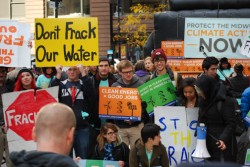 Hundreds of residents from Illinois, Indiana, Michigan and Wisconsin testified at the regional Environmental Protection Agency (EPA) office in Chicago, last week, calling on officials to enact the strongest possible limits on carbon pollution from coal- and gas-fired power plants. Hundreds of parents, community leaders, public health advocates and clean energy innovators spoke directly to EPA staff and at a rally on the harsh effects of climate disruption in their communities.
Hundreds of residents from Illinois, Indiana, Michigan and Wisconsin testified at the regional Environmental Protection Agency (EPA) office in Chicago, last week, calling on officials to enact the strongest possible limits on carbon pollution from coal- and gas-fired power plants. Hundreds of parents, community leaders, public health advocates and clean energy innovators spoke directly to EPA staff and at a rally on the harsh effects of climate disruption in their communities.
“If the clean air protections are strong enough, then rich fossil fuel companies will no longer get a free pass to pollute,” said Kim Wasserman with Little Village Environmental Justice Organization in Chicago. “They won’t be able to dump unlimited amounts of climate pollution into our air anymore.”
Coal- and gas-fired power plants are the country’s biggest carbon polluters, which mean that in order to address climate disruption, the EPA must issue strong carbon standards on power plants. Power plants are also responsible for life-threatening air pollution like smog, which triggers asthma attacks and other respiratory issues.
“I stand here with clean energy businesses, who are creating jobs in the technologies of the future, and who are ready to do so much more,” said Illinois State Senator Mike Frerichs (D-Gifford).
Climate disruption also means big costs for Americans both economically and environmentally. According to the Natural Resources Defense Council, last year alone Americans spent over $140 billion as a result of devastating droughts, raging wildfires, tragic floods, record heat and powerful storms. That’s $1,110 per American.
“Air pollution from power plants causes acute effects on public health and the long-lasting health impacts of climate disruption put our health at an even greater risk,” said Dr. Susan Buchanan, Director of Great Lakes Children’s Environmental Health Program at UIC School of Public Health.
According to the Union of Concerned Scientists, climate disruption negatively affects agriculture in the Midwest. Warmer temperatures in winter mean more pests and crop diseases can survive farther north. Wetter springs will increase erosion and can mean crops have to be planted later. Summers will likely be hotter and drier, causing stress on growing plants. Climate disruption could cost the agricultural sector in Illinois as much as $9.3 billion per year.








